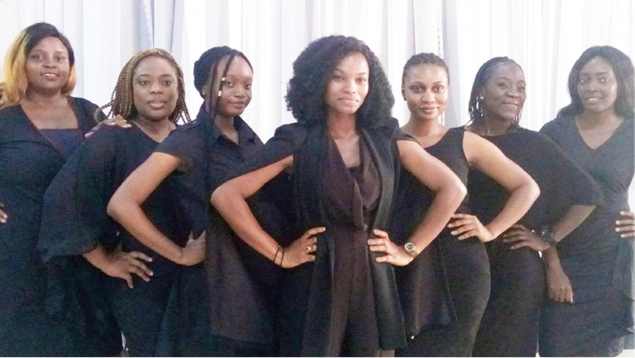Musical: ‘Habiba’ brings on stage plight of kidnapped girl-child
The ordeal of one of the over 200 girls kidnapped from the Government Girls Secondary School in Chibok, Borno State by the Boko Haram insurgents in 2014 has formed the focus of a musical stage play titled ‘Habiba’ staged recently at the MUSON Centre, Onikan in Lagos. Produced by Longshot Communications, a film production and […]

A file photograph of ‘Habiba’s’ cast
The ordeal of one of the over 200 girls kidnapped from the Government Girls Secondary School in Chibok, Borno State by the Boko Haram insurgents in 2014 has formed the focus of a musical stage play titled ‘Habiba’ staged recently at the MUSON Centre, Onikan in Lagos.
Produced by Longshot Communications, a film production and public relations company, the musical is the story of a vibrant and brilliant young girl brought to life on stage.
Using a fictional character whose name also formed the title of the play ‘Habiba’, the audience was taken through the girl’s journey from the events leading to the day she was kidnapped along with her school mates in April 2014 by members of the dreaded Boko Haram terrorists to the day she escaped from her captors.
According to the Creative Director, Longshot Communications, Mr Kelechukwu Anunibe, HABIBA seeks to draw attention to the plight of the girl-child in the society as well as raise questions on the unresolved issues surrounding the kidnapping of more than 200 schoolgirls in Chibok in 2014.
While he noted that, though some of the girls were later released at intervals by the Boko Haram following negotiations with the government, he lamented that many others are still held captive.
“The girl whose story is portrayed in the musical was kidnapped on the April 14, 2014. She managed to escape along with three other girls after months of horrifying treatment, rape and beatings, while some of her friends were killed in the Sambisa forest where they were being held captives. Habiba and three other girls were set free by one of the terrorists who had been a long-time admirer of hers.
“The story tells how resilience can bring out the strength needed to keep going. The ‘Bring Back Our Girls’ (BBOG) campaign that later attracted global attention was born out of this true-life event. On the night of April 14, 2014; female students numbering 276 were kidnapped from the Government Girls Secondary School in the town of Chibok in Borno State. Responsibility for the kidnappings was claimed by Boko Haram. Fifty-seven of the schoolgirls managed to escape over the next few months while some have described their capture in appearances at international human rights conferences.
“Since then, hopes were raised on various occasions that the 219 remaining girls might be released. Newspaper reports suggested that Boko Haram was hoping to use the girls as negotiating pawns in exchange for some of their commanders in jail. In May 2016, one of the missing girls, Amina Ali, was found. She claimed that the remaining girls were still there, but that six had died. Another 21 girls were freed in October 2016, while another was rescued the next month. Another was found on January 2017. Another 82 girls were freed in May 2017. One of the girls was rescued in January 2018,” he chronicled.
